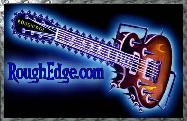



MESHUGGAH
"obZen" (Nuclear Blast; 2008)![]()
![]()
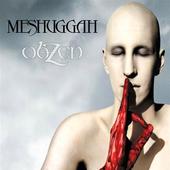
Reviewed by Jeff Rogers



![]()
"obZen" is the sixth full-length studio album from
Swedish metal monsters Meshuggah. This disc launched their first world tour to
date. The album cover does have some controversy to it and there are a couple of
versions available. The lower half of the androgynous picture is a woman while
the upper half is a male in the Zen lotus position. The figure is covered in
blood to symbolize finding peace while acting obscene. Okay, enough looking at
the album art. The disc's title, "obZen," means that mankind has found its Zen
in the obscure and obscene.
From the first second this disc will trample you into dust. It clocks in at
52:29 and the third track, entitled "Bleed," is 7 minutes and 23 seconds of
sheer brutality on two of your senses. Tomas Haake returns to the drum kit after
sitting out in lieu of the "Drumkit From Hell" which was used on "Catch
Thirty-Three." Drumkit From Hell is used on this disc but not as a replacement,
more like an enhancement.
Jens spends most of his time screaming his rage while the rest of the band
thumps out vicious riffs. Every now and then Meshuggah slows down their
spike-covered beating to brood some creepy sounding guitar. I think their
avant-garde style of metal is incredible. It's brutal but controlled in a way
that allows them to push their style without compromising their technical
genius. The drums have a jazz style to them on a few songs, and with rapid tempo
changes you really get a full on assault from start to finish.
Meshuggah; Jens Kidman – vocals; Fredrick Thordendal – lead guitars; Marten
Hagstrom – rhythm guitar; Tomas Haake – drums, spoken vocals; Dick Lovgren –
bass.
For more information, check out
http://www.meshuggah.net
or
http://www.myspace.com/meshuggah.
"Catch
Thirty-Three" (Nuclear Blast; 2005)![]()
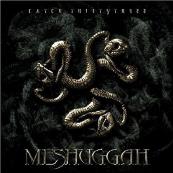
![]()
Reviewed by Mike SOS



![]()
When you speak of metal bands that have carved their own niche into the genre, Meshuggah is one of the first acts that come to mind. The progressively punishing quartet's latest exercise in raising the bar is
"Catch Thirty-Three," a blistering assault unlike any other on the scene today.
Brazen with the innate ability to hypnotically suck you in with off-kilter rhythms and esoteric structures while piledriving your skull with an ungodly sonic crush of the deepest low-end metal madness on the market, Meshuggah are quite possibly the most technically sound metal band on the planet, always striving to further their experimentations of mechanically inclined metal.
This brand of severe music is sometimes hard to grasp for the layman, but for those ready to travel to new realms and push boundaries, Meshuggah is the band to hit up.
For more information visit http://www.meshuggah.net.
"Rare Trax" (Nuclear Blast; 2001)![]()
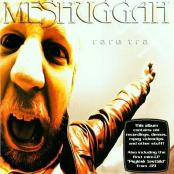
![]()
Reviewed by Christopher J. Kelter



Releases by semi-established bands that are basically clearing the closet demand a (nearly) track by track review so there's no point wasting your time or mine.
"Rare Trax" starts off with the grinding technical mayhem of "War" which quite frankly would have been better served at the end of the audio portion of the CD.
Two of the three songs on the 1989 demo "Psykisk Testbild" appear here in their original form. "Cadaverous Mastication" is the better of the two songs and would later appear on "Contradictions Collapse" in a re-recorded form. "Debt Of Nature" is included with re-recorded vocals from Fredrik Thordendal.
"By Emptyness Abducted" and "Don't Speak" (it's not the No Doubt song) are included from a time when Meshuggah got some free recording time. Considering that these songs were written and recorded in one or two days is pretty indicative of this band's ability to construct something from nothing. These two songs aren't great, but bad Meshuggah is better than no Meshuggah at all.
The original demo versions of two songs off of "Contradictions Collapse" are included as well. There's nothing particularly stellar on these two tracks although I must admit that you do get an earful of Jens Kidman's very James Hetfield like vocal rumblings which I've mentioned in previous Meshuggah reviews.
A remix of "Concatenation" that features a slower pace and non-polyrhythmic drumming makes this song seem actually what might be considered a normal hard rock song compared to the all-out assault of "Chaosphere."
The final, and tenth track, is a chaotic noisescape of stuttered guitar riffs, unsyncopated beats, and random shrieks. In the grand scheme of things this track is a complete waste, but I bet real Meshuggah-heads will pour over this track searching for any meaning that they can.
Also, "Rare Trax" includes two video clips; a live version of "Elastic" and the super-high-production values (tongue firmly in cheek) of "New Millennium Christ." These video treats often don't offer a whole of musical perspective, but gives you some visuals to go along with the music that you love.
All in all "Rare Trax" is pretty much for fanatic fans of Meshuggah – people like me.
For more information visit http://www.meshuggah.net.
"Chaosphere" (Nuclear Blast
Records; 1998)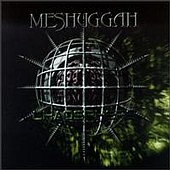
![]()
![]()
Reviewed by Christopher J. Kelter



![]()
Hailing from Sweden, Meshuggah are basking in the recent spotlight of publicity from
Rolling Stone magazine's Top Ten Metal Bands (February 4, 1999). Deservedly so. Meshuggah
are a breath of fresh air in this diverse world of metal in all of its various forms.
Drawing on the staccato pulse of hardcore, the subtle virtuosity of Rush, and the
discipline of free-form jazz, Meshuggah are making a strong case for being the band to
watch in the near future.
"Chaosphere" is an eight song collection of brutal metal accented with jazz-like
textures. The rhythms initially sound like standard fare, but the unique polyrhythmic
guitars really stand out after a few listens. On top of that, the unique lead lines
that sometimes sound like a jazz player gone crazy take this album to unfamiliar heights.
The most accessible song is "Neurotica." This song speaks of a man who perceives
he is lost in never-ending change and progress at his own expense. He realizes he must
"play the game" to be a part of the success yet all the while trying to remain
an individual despite the struggle of an inevitable end. "New Millennium Cyanide
Christ" and "Sane" are also very strong tracks. There are no weak songs on
this album except to say that Meshuggah are sometimes so relentless that it does make you
wish they'd change tempos every now and then.
Most of the song-writing chores are handled by the twin guitar duelists of Marten Hagstrom
and Fredrik Thordendal; Tomas Haake handles lyrical duties who is also the band's drummer.
Vocalist Jens Kidman can bark with the best of them, yet he has a dazzling array of
techniques and styles that only add to the ferocious nature of the music. Bassist Gustaf
Hielm rounds out the band.
Time will tell if this is a landmark record, but I'd have to say that something so unique
and startling will stand the test of time.
To learn more about Meshuggah check out their website http://www.meshuggah.net/
"Destroy
Erase Improve" (Nuclear Blast Records; 1995)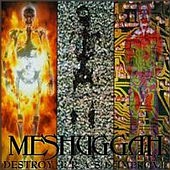
![]()
![]()
Reviewed by Christopher J. Kelter



![]()
I may not know a lot, but I do know this - whatever patterns your brain
has in its cranial synapses will be permanently rearranged after listening to "Destroy Erase
Improve." Meshuggah have taken a heavy abrasive style of music and applied a serious dose of intelligence to
arrangements, lyrical subject matter, and have created an overwhelmingly original package.
This may be the only disc that Meshuggah produced with any presence of melody. On their next
full-length ("Chaosphere") Meshuggah would completely forgo sustained melodic passages - that's
what makes "Destroy Erase Improve" such a magnetic work of art. The juxtaposition of
melodic passages and the technical rhythms is a stimulating change from the norm.
Every track is staggering; however, I feel obligated to point out a few highlights. "Future Breed
Machine" is a pummeling exercise in agitation. The spoken word ambience of "Sublevels" is at
once comforting and disturbing. "Suffer In Truth" is soaked in a spirit of dedicated aggression.
"Transfixion" has a guitar solo with such a fanciful flight of melodic insanity it must be heard to be
believed.
Meshuggah slow down for only one song, "Acrid Placidity," and even here an underpinning of dark mysterious secrets in its arpeggio and legato guitar swells betrays the relative calm of the tune.
The lyrics deal with the struggle of the individual to remain sane while confronting the horrors of everyday life: mind control, the numbing growth of conformity, the commercial machine as God, and the power of the mind to rise above all. The vocals are driven with such force you can hear the desperation of the human soul surviving life's hardships.
A word of caution: this is not something that can be listened to in a casual manner. Many repeated listens are required to get the full effect. Meshuggah's music must be studied and absorbed - the music must be allowed to impenetrate the very underutilized recess of your brain. The "work" will pay off, trust me - there is no greater reward to hear the initially confusing Meshuggah sound become completely acceptable to your sonic memory banks.
"Destroy Erase Improve" was produced by Meshuggah and Danne Bergstrand. The disc was mixed by Damme Bergstrand and Fredrik Thordendal.
Meshuggah are Fredrik Thordendal on lead guitar, Marten Hagstrom on rhythm guitar, Peter Nordin on bass, Tomas Haake on drums, and Jens Kidman on vocals.
For more information visit http://www.meshuggah.net and get copied, dissected, and distorted.
"Contradictions Collapse/None" (Nuclear Blast
Records; 1991)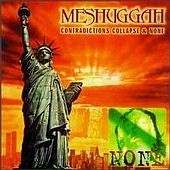
![]()
![]()
Reviewed by Christopher J. Kelter



![]()
Available for the first time in America on one disc is Meshuggah's full-length 1991 debut
"Contradictions Collapse" and the 1993 follow up EP "None."
The embryonic "Contradictions Collapse" is nothing like 1998's soon-to-be
classic "Chaosphere" (see review above). The tunes are slower, less industrial,
more thrash-like, and less progressive than more recent material. However, the
classic Meshuggah elements are in abundance. Even in 1991 there was clear evidence that
Meshuggah were breaking new ground in crafting their unique blend of heavy metal and
industrial orderliness.
The EP "None" expands on the Meshuggah style by adding more perceptible
industrial overtones. The guitars are noticeably more abrupt which adds to the harsher
feel of the music. At the same time, however, "None" has suggestive arpeggios
which allow the songs to have a more diverse harmonic base.
Although the influence of early Metallica is obvious, the complex rhythms that make
Meshuggah so unique are developing with the band's growing confidence. The mega-percussive
chordal wall of sound is at times more brutal than early Metallica without being too
derivative. The asymmetrical arrangements give each song an urgency rarely heard in
heavy metal; collectively, the arrangements ultimately give the two works depth and
character.
The rhythms are fairly straight-ahead, yet the crafty odd time signatures creep into the
music. The lead guitar of Frederik Thordendal clearly shows his jazz-like tone - the
blistering leads take on a free-form style like a great horn player. Tomas Haake's
drumming, which is very critical to the band's overall sound, provides a stunning display
of rhythmic inventiveness - Haake's odd-meter attack plays an integral part in the musical
siege and is the fundamental reason why Meshuggah sound so fresh.
The lack of melody in the singing is not a detraction from the overall musical landscape.
In fact, the harsh vocals are the perfect complement to the mechanized glory of
Meshuggah's insanity.
If you enjoy thrash more than today's contemporary metal
leanings then "Contradictions Collapse" and "None" will be an
interesting addition to your CD collection. Also, if you dig Fear Factory, both
"Contradictions Collapse" and "None" are very similar in style as to
almost guarantee your musical satisfaction.
The production is fantastic. Great care was taken to record the music properly to achieve
the heavily distorted, yet clear sound. Meshuggah employ a wide variety of technology and
studio recording techniques to capture their sonic attack. The lack of reverb is the
defining characteristic of the sound, yet its absence is the reason for the unique sound
in the first place.
The line up for "Contradictions Collapse" is Jens Kidman on vocals, Fredrik
Thordendal on guitar, Peter Nordin on bass, and Tomas Haake on drums with the same line-up
being employed for "None" with Marten Hagstrom as the second guitarist.
"Contradictions Collapse" and "None" were both produced by Meshuggah.
For more information visit the band's homepage at http://www.meshuggah.net/
and experience the awesome power of Meshuggah.
Rating Guide:



 A classic. This record will kick your ass.
A classic. This record will kick your ass.


 Killer. Not a classic but it will rock your world.
Killer. Not a classic but it will rock your world.

 So-so. You've heard better.
So-so. You've heard better.
 Pretty bad. Might make a nice coaster.
Pretty bad. Might make a nice coaster.
![]() Self explanatory. Just the sight of the cover makes you wanna hurl.
Self explanatory. Just the sight of the cover makes you wanna hurl.
Copyright © 2009 by R. Scott
Bolton. All rights reserved.
Revised:
23 Dec 2024 12:35:39 -0500
.
